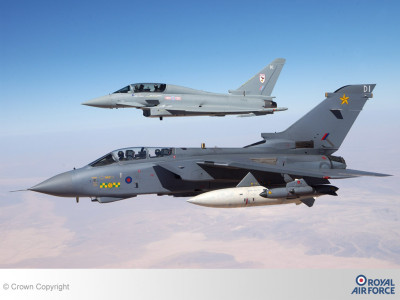This analysis is being developed for The Birmingham Brief, “intelligent thought on policy issues” from the University of Birmingham:
On September 26, the British Parliament approved the Cameron Government’s request for authority to carry out airstrikes inside Iraq on the Islamic State. Four days later, two Tornado jets on an “armed surveillance” mission dropped the first bombs, hitting a jihadist heavy-weapon position and an armed pick-up truck.
This is the easy part of the story.
Far more challenging, beyond the headlines celebrating British’s first armed operations since 2009, is how London makes the aerial operations part of the US-led mission to “degrade and eventually destroy” the Islamic State — not only in Iraq, but also in neighboring Syria.
Since its air attacks began on August 8, the US has supported ground operations by Iraqi and Kurdish forces. Initially, the attacks helped check the Islamic State’s offensives, which threatened Iraqi Kurdistan and areas north and west of Baghdad. They claimed key installations, such as the Mosul Dam, Iraq’s largest. And they have assisted the Kurdish counter-offensive reclaiming towns and villages in the north of the country.
However, it is one matter to operate on the outskirts of the Islamic State’s area of control Iraq, and another to strike at its core. The jihadists have established control of key cities — Fallujah in western Iraq, taken at the start of this year, and Iraq’s second city Mosul and Tikrit, captured in June’s move through northern Iraq towards Baghdad.
The Islamic State combines that quasi-state with a mobile approach to attacks, enabling it to strike around the country even as it faces the airstrikes and counter-offensives. It holds a line within 50 miles of Baghdad, and has carried out hit-and-run assaults — including suicide bombs — in the capital and on its outskirts. It is well-equipped, having seized armored vehicles, artillery, and other heavy weapons in its advances across Iraq.
A systematic campaign to remove the jihadists from the cities, while degrading its ability to continue “asymmetric” warfare with mobile forces and bombings, will require a longer-term campaign of planning and operations. Politically, it will need to win over Sunni factions who have been aligned with the Islamic State — and that in turn will require the building of confidence in a new Iraqi Government, installed after years of in-fighting and growing animosity towards the now-departed Prime Minister Nuri al-Maliki.
That is not to diminish Britain’s contribution to the intervention — far more important than its symbolic airstrikes have been its provision of intelligence, coordination over planning and logistics, and even special forces on the ground — but this is only a support role in the early stages of a political-military campaign.
Meanwhile, Britain is close to absent from the even more important crisis in Syria, where the US military intervention is in trouble after only a week of operations.
The Cameron Government made clear, in its approach to Parliament, that it was not proposing British operations inside Syria. In part, that was because of the difficulty in establishing a legal case for military action. In part, it was because of the memory of Parliament’s stinging rebuke of the Government a year ago, when it vetoed a response to the Assad regime’s chemical weapons attacks near Damascus that killed up to 2,000 people.
However, the greatest hurdle is a lack of strategy about the intervention against the Islamic State. Since airstrikes alone will not defeat the jihadists, the logical step is to work with Syria’s insurgents, who have been fighting the Islamic State across northern and eastern Syria since January.
But the insurgency does not want to limit operations to that fight — they also want to use aerial operations, weapons, and training to bolster their effort against the Assad regime and its military.
The US, which has hesitated over its support for the insurgency for more than two years, is so beset with confusion about “extremists” and the Syrian opposition that it has refused to link its air attacks to ground operations. Indeed, on the first day of American attacks on September 23, US missiles hit two locations of the insurgent group Jabhat al-Nusra, killing more than 60 fighters and at least 14 civilians.
The outcome has been an unravelling of the American campaign. Far from welcoming the effort against the Islamic State, Syria’s opposition and insurgency has been united in criticism of the US airstrikes. Indeed, almost the only voice supporting the intervention is that of the Assad regime, which has cautiously welcomed the attacks following American assurances that the Syrian military will not be targeted.
On Wednesday morning, Britain announced that its aerial campaign had already expanded, as Islamic State targets were hit west of Baghdad. But such announcements offer no idea how London will expand its political effort for a coherent strategy against the jihadists not only in Iraq but also in the “sanctuary” of Syria — so that points to a protracted intervention with no resolution.

